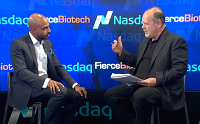 The big question of the day is whether the unprecedented bull market we've been seeing generate billions of dollars for biotech is sustainable or has transformed into a fragile bubble ready to pop. And we decided to put that question to our audience of subscribers, looking for a revealing snapshot of what the industry is thinking today.
The big question of the day is whether the unprecedented bull market we've been seeing generate billions of dollars for biotech is sustainable or has transformed into a fragile bubble ready to pop. And we decided to put that question to our audience of subscribers, looking for a revealing snapshot of what the industry is thinking today.
A total of 656 people participated in the survey, our first, and the group came down on the side of a bubble--but just barely.
It was nip and tuck during the 5 days we kept the survey open, but 342 people fingered a bubble with 314 taking the position that the market will soldier on awhile yet, continuing to pay off for biotech with a market that has remained wide open to IPOs for more than two years. That's a 52%-48% squeaker.
Rather than summarize their opinions, I thought it would be interesting to select a sampling of their positions. Many of the thoughts below reflect the concerns, and hopes, of the larger group.
Obviously, I'm not presenting this as anything other than a quick snapshot of opinions. But the sheer volume of responses, along with the considered positions of quite a few industry insiders and outsiders, does help illustrate the two divergent streams of thought about the biotech market.
In the meantime, if you have an idea for a future FierceBiotech survey, and there will be more, drop me a line. -- John Carroll (email | Twitter)
Here are some pointed remarks about the bubble:
 |
| Adam Kline |
Adam Kline, PhD -- Bubble
Risk assets within overall equity bubble fueled primarily by loose monetary policy. If macro picture changes biotech will be dumped fast.
Randy Riggs -- Bubble
Many of the assets are in early stages where failure rates to reach market still exceed 80%. Also, many later stage assets do not provide meaningful clinical benefits over existing drugs on the market, which will impact the price such drugs can command from payers (e.g., CMS, HMOs, etc.)
Michael Baldwin -- Bubble
The amount of funding that has been poured into these biotech companies can't sustain the predicted revenue around those valuations. There simply aren't enough lucrative approved products a year, especially given that only 2-3 in 10 drugs recoup their development costs. The NBI has never been higher, and once there are a cluster of failures (2 or 3 high profile ones in a row) several of these high value companies will take a hit.
Janet S. Lee, PhD -- Bubble
There's not enough data to support valuation of most of the "hot" prospects - think Juno, Kite, etc and how did Pharmacyclics get $21 billion from AbbVie. Imbruvica will not capture a much larger market than it has now. However, these are the excesses - there are scientifically sound biotechs doing good work out there that do deserve more funding, so I hope the well doesn't dry out altogether.
 |
| Watch John Carroll and Bloomberg Intelligence analyst Asthika Goonewardene discuss the survey. |
Jeff Chmielewski -- Bubble
Quite simply, valuations are growing at an exponential pace versus available reimbursement dollars. Large cap biotech players are redeploying capital from investments made years ago, yet paying multiples of what they did a few years ago. The reality is that forward ROIC will be very low. As ROICs drop, so will reinvestment, leaving no one to take out the record Biotech start-ups trading at record valuations. Or think of it this way: Companies like ABBV are getting in price wars for both the companies they buy to fill their distribution channels (see: PCYC) and for the drugs they move through their distribution channels (see: GILD). Is that in any way sustainable? There is a reason the smartest guys around (Gilead) have embarked on a capital return program instead of a transformational acquisition. There are simply no opportunities available like VRUS. The cycle has peaked and very few realize it yet.
Former Dendreon employee -- Bubble
Markets should not be estimated prior to knowing cost of goods sold and price obtainable. In most cases, even the companies with these sky-high valuations do not know either of these things, investors certainly do not. When/if drugs from these companies hit the market, there will be disappointment and pain for investors.
Anonymous -- Bubble
Overexuberance. None of the biotechs in the story are worth the going price. 3-5X overpriced. Someone is going to have to pay for this. The next batch coming out will be devalued just as much as these stocks are overpriced. Rarely does the market get it right. It is always somewhere on the swing up or down.
Karl Weinrich -- Bubble
When it's too good to be true, it is. After experiencing the NASDAQ crash to 50% of its value a few years ago, all the markers are the same. And I'm not usually pessimistic.
This market has legs, and here's why:
 |
| Asthika Goonewardene |
Asthika Goonewardene, Bloomberg Intelligence -- Sustainable
Top half of NBI supported by strong fundamentals. Bottom half of NBI helped by M&A interest, spurred by pharma's need and low interest rates. Risks are that pricing pressure and clinical failures rattle sentiment. Yet history has shown a proper dent requires a series of unfortunate events, and all up to now have been transient.
Don deBethizy -- Sustainable
Strong capital markets have created opportunity as many companies are moving pipeline product candidates forward. Many of these are in rare diseases where the therapies are highly targeted and thus more likely to show a signal. This positive news flow will reenforce the general sense that the sophistication of biotech is creating a more sustainable industry.
Laurent Fischer -- Sustainable
60% of new drugs launched by Pharma are externally developed. If a fraction of the >$80bn annual R&D spent by Pharma is allocated to acquisition / funding of new companies the market will be sustained. FDA approvals of NCE reached a record. Pharma is closing R&D and innovation will continue to be rewarded by markets!
Steven Ramael -- Sustainable
Small companies can follow paths that Big Pharma will never examine because of their rigid structures and procedures, preventing all innovative thoughts and actions. Small companies have a culture of winning and delivery, less politics... whereas Big Pharma has a culture of job protection and a lot of (hypocrite) politics... Big Pharma also pays KOLs that don't know s*!t of drug development/innovation/science.
Russ Belden, CEO, Bridge Consulting -- Sustainable
M&A and positive catalysts/earnings from the big boys will keep the sector as a whole on track and growing....we are in a secular bull market in biotech! That said, there is a lot of stupid money chasing new technologies and when the market and/or biotech takes a 7% breather, more money will come out of the new companies (e.g. with no revenue) faster....they WILL get hit 10-15% while the bigs will get hit 4-6%.
Doug MacDougall -- Sustainable
Lots of money still on the sidelines to chase exciting new stuff.
Alan M. Apel -- Sustainable
You made me give an answer and I'm voting self interest with at least 80% of portfolio in Biotech stks, mutuals index funds etc. That said, it's unreasonable that voting sustainable means it will be all good all the time w/o a shakeout. There will be some who will live and remain as companies; some that will be bought out /merge and some that will disappear w/o much of a trace. About the only factual point left for me to make is that for at least the last 3-4 years, the biotech instruments of the major investment houses - Fidelity, Vanguard etc - have out performed the overall mkt. The sustainability can be expected to continue as long as those offerings continue to at least perform as well as overall market.
Ray Williams -- Sustainable
Biotechs seem to be more effective than big pharma at finding key new drugs. Big pharma needs key new drugs and have the structures to promote them effectively. Therefore big pharma needs the biotechs (and vice versa!) and must be prepared to pay for good opportunities. My understanding, too, is that biotechs are by no means overvalued currently. So there is room for continuing the biotech 'boom'
On the fence:
 |
| Glen Giovannetti |
Glen Giovannetti, EY
My answer is actually both because I think it is sustainable for the market leading companies who aren't over priced from a PE perspective (generally) despite the worsening of pricing headwinds. Revenue producing or later stage companies are also more likely to be taken out for a premium. The early stage companies, including may recent IPOs do appear priced for success (ie little risk factored in) and as you point out in the article, we know there will be bumps, setbacks and outright failures which will impact overall market psychology and valuations.
Richard Law
Different this time around. It is sustainable, but only for the top 20 - 25% of cos., probably due to perceived pricing power, great science or improved regulatory mechanisms. The bubble will burst for middling and below cos. Will be interesting to see how and when this shakes out.